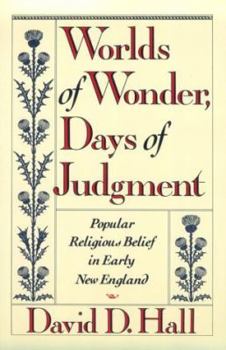Worlds of Wonder, Days of Judgment: Popular Religious Belief in Early New England
Select Format
Select Condition 
Book Overview
This book tells an extraordinary story of the people of early New England and their spiritual lives. It is about ordinary people--farmers, housewives, artisans, merchants, sailors, aspiring... This description may be from another edition of this product.
Format:Paperback
Language:English
ISBN:0674962168
ISBN13:9780674962163
Release Date:October 1990
Publisher:Harvard University Press
Length:336 Pages
Weight:1.05 lbs.
Dimensions:0.9" x 6.1" x 9.2"
Customer Reviews
2 ratings
Social history of Early New England popular religion
Published by Thriftbooks.com User , 18 years ago
In Worlds of Wonder, Days of Judgment, David Hall makes a strong case for defining popular religion in early New England as an interdependent endeavor influenced by both clerical and lay forces. Hall analyzes the relationships of the clerical and lay populations at the book market, in the meetinghouse, and during the performance of rituals. He asserts that these locations act as significant social and religious intersections in which the clergy and the lay population must negotiate their differences. The consensuses they reach are often unstable and must be renegotiated, but this seems to be the major impetus behind Hall's work: Popular religion is about negotiation, market competition, meetinghouse parleys, and arbitrated ritualism. The final chapter of the novel is a treat of sorts - selections from and analysis of the diary of Samuel Sewell. Sewell's writings bring Hall's book together in the words of a real person who lived in Early New England. I recommend this book for its intelligence, clarity, and unique subject matter.
Worlds of Wonder, Days of Judgement
Published by Thriftbooks.com User , 24 years ago
Hall uses the popular religion of early New England to argue that for clergy and lay people alike religion was a part of everyday life, and although the clergy and lay people's religious interpretations of events could differ their choices of interpretation were limited by their shared culture. Hall argues that the vast majority of the early New Englanders shared a common middle class background and a common religious background influenced by the Reformation. Both the clergy and lay people agreed that it was especially important for each person to be able to read the Bible on his own. But, the power to read the Bible also gave lay people the confidence to have interpretations of the Bible that differed from those of their ministers. The belief in wonders, supernatural events or extraordinary events (earthquakes, meteors, etc.), was a remnant of their Elizabethan culture. Both clergy and lay people attributed religious meanings to wonders, with the clergy sometimes writing popular books detailing wonders. The popularity of these stories encouraged the printing of wonder books not written by clergy as well. By the later 1600's, the clergy were increasingly attributing wonders to explainable natural events, but with the self-confidence gained by their literacy lay people still often gave religious significance to natural events. Their shared culture made universal literacy extremely important, but literacy empowered lay people to disagree with clergy sanctioned interpretations of Scripture. This empowerment of the lay people went so far as to have them feel confident enough to disagree with their ministers over the issue of sacraments, particularly baptism and the rites of the Last Supper. This confidence also gave lay people the ability to break rituals, such as confession, weddings (dancing even though it was prohibited), and sickness (relying on doctors and folk medicine instead of only on prayer).





